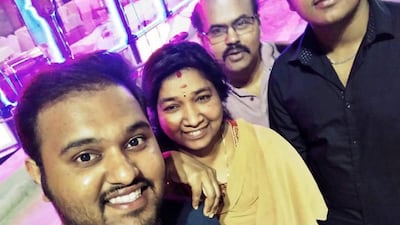Indian families in the UAE face a wait of several weeks to complete the funeral rites of relatives who died during the coronavirus pandemic.
A backlog at privately run crematoriums in Dubai, Sharjah and Al Ain, the need for special permission to hold funerals and a lockdown in India have contributed to delays.
Dubai's Jebel Ali crematorium, which is run by a Hindu Cremation Ground committee, would normally handle about 30 bodies, but that increased to 113 bodies in May.
About 260 people have died from Covid-19 in the UAE.
India's consulate in Dubai said officials would work with families and crematorium managers to find a solution.
"We know about the issues. We have been able to send almost 40 remains to India after resumption of flights," Consul General Vipul told The National.
"It is taking time to complete the cremations here but cremation grounds are trying to make alternate arrangements.”
The body of Sabu Chellappan, who was from Kerala, died from Covid-19 on May 11 and is due to be cremated on June 7 – the earliest slot available at a Sharjah crematorium.
His family plans to conduct funeral rituals in India next week.
“It is a very sad situation because we can’t do any pujas [prayers] for Sabu,” a cousin, M S Kamlesh, said.
“Sabu had a very large heart, he helped everyone. His wife, daughter, our entire family, is waiting and waiting for the cremation because until that is completed we cannot start the last ceremonies.”
Patients who die as a result of contracting the virus must be covered and their bodies taken by ambulance directly to a crematorium to be incinerated, in accordance with local regulations.

The body of a Covid-19 victim must also be buried or cremated in the country where they died and cannot be repatriated.
The outbreak has also caused delays in the cremation of residents who died of other causes.
Sharjah resident Akash Vasu, whose father, Vasu Ponnuchami , 55, died of a heart attack on May 10, said he struggled to arrange for the body to be cremated.
“For two weeks I have been running around trying to make it happen faster, now I have accepted it will only happen on June 1,” he said.
“Until now, I have not been able to see my dad’s body even though he is not a corona case.
"I was told because of the coronavirus situation, I cannot see him. It has been very difficult for us.”

Multi-faith cremations of people of different nationalities are carried out at Sharjah's crematorium in Juwaiza, the New Sonapur Hindu Cremation Ground in Jebel Ali and Al Foah Crematorium in Al Ain.
People from countries including India, the Philippines, Nepal, Bangladesh, the UK and Australia have been cremated at those centres.
An average of about five bodies were cremated each day in Dubai and Al Ain, with two bodies cremated every day in Sharjah.
But the number of daily cremations at the Dubai crematorium was increased to 12 from last Wednesday, with staff working in shifts from 6am until midnight to clear a 10-day backlog.
Before the pandemic, the crematoriums used three incinerators in Dubai and one each in Sharjah and Al Ain.
The Dubai crematorium has ordered another incinerator to help it cope with the larger intake of bodies. It will take a month to install.
“We never had a queue before but now we cannot cope up and there is a line. So we are trying to help to clear the backlog,” Vasu Shroff, head of the Hindu Cremation Ground committee, said.
“By increasing the shifts, we can take in double the number.”
He met local authorities to discuss handling more cremations.
“Before we sometimes had one cremation daily, but on average now we are getting five to six bodies daily,” he said.

The cremation process takes about five hours to complete, including the time needed for the incinerator to cool and ashes to be collected and handed over to relatives.
“Machines can only take so much load so we need to give them a break before we start it again,” Mr Shroff said.
The bodies are only brought to the crematoriums after it has been cleared by police and municipality authorities.
The additional documentation required to confirm a cause of death and sanitisation measures at crematoriums have also led to delays.
Regulations state that between four and six family members are given 15 minutes to pay their respects to people who died of causes other than Covid-19.
Before the outbreak, about 200 people could gather with flowers for ceremonies that lasted longer than an hour.
“There needs to be dignity in the last moments but we also must follow guidelines to ensure everyone is safe,” Mr Shroff said.
Social workers have called for alternative arrangements to be made so families can complete funeral rites in time.
K V Shamsudheen, a social worker who advises Indian workers on financial planning, has written to authorities suggesting that a temporary crematorium site is set up in the desert to help clear the backlog.
His plan would involve using wood to cremate bodies, as was traditionally done in Dubai.
“The family goes through trauma worrying about the body lying in wait for a final resolution. We get many calls but we are not able to give the families any answers,” he said.
The Indian consulate in Dubai said it would also write to authorities about resuming traditional cremations if delays continued.


